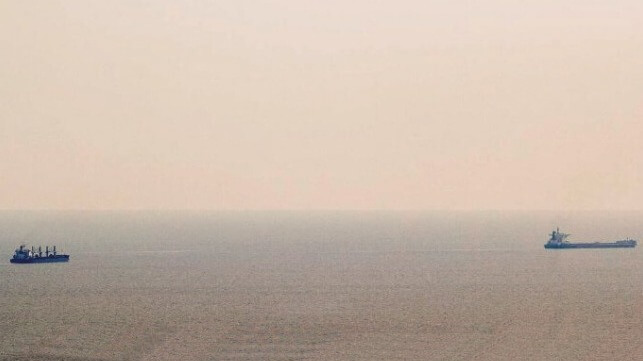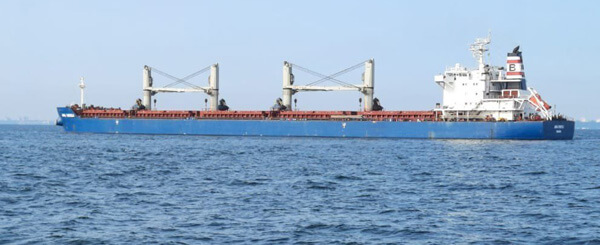Two Bulkers Carrying Iron and Ore Depart Ukraine Testing Black Sea Corridor

Ukrainian officials are reporting that two more bulkers have departed using the humanitarian corridor to break out of the Russian blockade of the country’s Black Sea ports. Both vessels had been trapped in Ukraine since the start of the war in February 2022, but unlike other vessels are not carrying grain or foodstuffs.
The Vice Prime Minister for the Restoration of Ukraine, Oleksandr Kubrakov, and the Ministry for Communities and Territories Development and Infrastructure of Ukraine, posted the reports to social media and released pictures of the vessels which they said were departing Pivdennyi. Both vessels are reportedly being managed by a Singapore-based shipping company on behalf of their owners. The AIS signal shows the vessels sailing in tandem staying close to the Ukrainian coast at speeds between 6 and 10 knots.
One vessel, Greek-owned and registered as the Filia Glory is displaying a new name of Anna Theresa on its AIS. Registered in Liberia, it was built in 2011 and is 58,0000 dwt. Ukrainian officials are saying the vessel, which had been in port since February 22, 2022, is carrying 56,000 tons of pig iron. According to its AIS signal, the vessel is heading for Varna, Bulgaria, where it will arrive tomorrow.
The second vessel is the Japanese-owned Ocean Courtesy (177,000 dwt) registered in the Marshall Islands. Built in 20008, the vessel is reported to be carrying 172,000 tons of iron ore concentrate and bound for Constanta, Romania, where it will arrive tomorrow. It had been in the Ukrainian port since February 16, 2022.

Displaying the name Anna Theresa on AIS the bulker was one of two to depart Ukraine today (Interior Ministry/Telegram)
These ships became the third and fourth to leave Ukraine since the Navy declared on August 8 that it had established the corridor and would assist vessels that registered and were willing to accept the risks associated with running the Russian blockade. Ukraine asserts that it registered the route with the International Maritime Organization and that the Council of the UN organization recognized its international right to free commercial navigation. The IMO called on Russia to stop threats and comply with international conventions.
While Russian officials have complained about the ships and said they could be considered hostile, no effort was made to stop either the Joseph Schulte, which departed on August 16 for Turkey, or the Primus, which departed on August 27. The only vessel that was stopped and boarded was an inbound bulker heading to the Danube ports.

that matters most
Get the latest maritime news delivered to your inbox daily.
Turkish officials, however, have publicly called the movement of vessels “dangerous.” Reports today are that Turkish President Recep Tayyip Erdogan and Russian President Vladimir Putin will meet early next week. Restoration of the grain deal is reported to be among the points Turkey plans to advocate for during the meeting.
Metals and minerals were another important export for Ukraine before the war. A Ukrainian research firm, GMK Center, asserts that Ukraine is losing $420 million each month with the closure of the Black Sea ports. They calculated that exports provided $20 billion per year in foreign exchange earnings, with $5 billion in taxes. In a report prepared by GMK Center, they said that Ukraine had exported 1.3 million tons of iron ore, 151,000 tons of pig iron, 192,000 tons of semi-finished products, and 218,000 tons of finished metal products each month before the start of the war.
